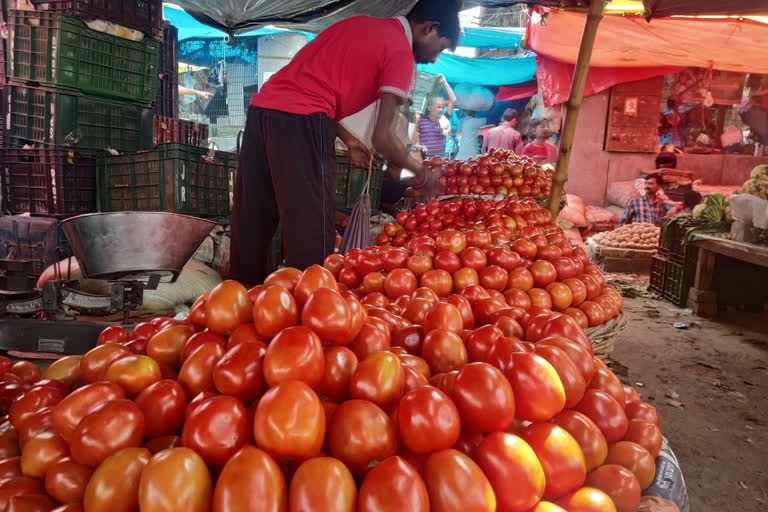New Delhi: In the wholesale markets of national capital, the prices of all vegetables, including tomatoes, onions have declined sharply by up to 60 per cent across the country, mainly due to higher production, compression of demand and market disruption amid COVID-19 crisis. In Asia's largest wholesale market for fruits and vegetables -- Azadpur Mandi, tomatoes have started selling at less than Re 1 per kg.
However, the retail prices of most vegetables remain firm.
According to data maintained by AGMARKNET under the Union Agriculture Ministry, the wholesale tomato prices were ruling below Rs 5 per kg in some states on May 24, while that of onion to Rs 6 per kg in the key producing state of Maharashtra. However, potato prices were stable at 12-13 per kg.
According to AGMARKNET data, all India average wholesale rate of tomato dropped by 60 per cent to Rs 11 per kg on May 24 from Rs 27.50 per kg a year ago. Prices have fallen in 19 states but a sharp fall of up to 83 per cent was seen in Telangana, Karnataka, Andhra Pradesh and Maharashtra.
In Telangana, prices declined by 83 per cent to Rs 4.69 per kg on May 24 from over Rs 27 per kg a year ago, while prices in Karnataka slipped by 80.76 per cent to Rs 4.41 per kg from Rs 23 per kg.
In Andhra Pradesh, prices dropped by 75.48 per cent to Rs 4.88 per kg from Rs 20 per kg.
The wholesale prices of onion declined mainly in three states -- Maharashtra, Karnataka and Delhi.
In Maharashtra, the wholesale rates fell by over 27 per cent to little over Rs 6 per kg on May 24 this year from Rs 9 per kg a year ago, while in Karnataka rates fell by 17 per cent to Rs 8 per kg from Rs 9.50 per kg.
The wholesale rate of potato, however, rose 44 per cent to Rs 18 per kg on May 24 from Rs 12.50 per kg a year ago. In Uttar Pradesh, it jumped two-fold to little over Rs 16 per kg. In Delhi too, rates have almost doubled to Rs 15 per kg.
Mandi traders and agents say that the number of vegetable retailers has decreased in the market, due to which the demand is less.
The auditor of Okhla Mandi, Vijay Ahuja told IANS that not only tomatoes, but other green vegetables are also being sold at a quarter to one price.
Ahuja said that the wholesale price of 'Ghiya or louki' (Bottle Gourd) has increased from two to three rupees per kg and the 'Turai' (Ridge Gourd) is being sold for Rs six per kg.
Similarly, the prices of other vegetables have also come down. The average price of onion has dropped by one and a half rupees so far this month.
Ahuja said that the price has come down due to the migration of millions of people from Delhi.
Rajendra Sharma, a businessman at the Azadpur Mandi and president of the Indian Merchant Association, said that the prices of all vegetables, including tomatoes, have come down due to reduced demand in the market.
Read more:Extension of moratorium on loan repayments will induce a habit of not paying loans: Vineet Rai
He said that the restaurants, dhabas are closed which has reduced the consumption.
Besides the reduced demand, Sharma said that because of the token system, customers have to wait longer, which is also dissuading them from coming to the market.
Another trader from Mandi said that lakhs of labourers have migrated from Delhi, so the consumption of vegetables has reduced, but the demand for fruits has not reduced, so the price of fruits has not come down.
According to the rate of Azadpur Mandi APMC, where the wholesale price of tomato was Rs 6-15.25 per kg on May 1, the cost is Rs 0.75-5.25 per kg for the last three days.
Similarly, where the wholesale price of onion was Rs 4.50-11.25 per kg on May 1, it was Rs 2.50-8.50 per kg on Saturday.
However, in various colonies of Delhi and surrounding areas, vegetable vendors are selling tomatoes for Rs 15-20 per kg.
Similarly, the prices of other vegetables are also moving higher than the wholesale price. Asked the reason for this, Shivpal, who is selling fruits and vegetables in Delhi's R.K. Puram, said that some of the vegetables or fruits that he brings from the wholesale market in the mandi, gets spoiled. Apart from this, the fare of transporting is higher, so they have to sell at a higher price than the wholesale market.
(IANS and PTI Report)



